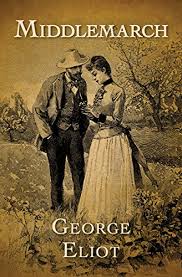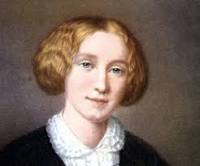Middlemarch Page #4
Middlemarch, A Study of Provincial Life is a novel by the English author George Eliot, appearing in eight instalments in 1871 and 1872. Set in a fictitious Midlands town from 1829 to 1832, it follows distinct, intersecting stories with many characters.
“I am sure—at least, I trust,” thought Celia, “that the wearing of a necklace will not interfere with my prayers. And I do not see that I should be bound by Dorothea’s opinions now we are going into society, though of course she herself ought to be bound by them. But Dorothea is not always consistent.” Thus Celia, mutely bending over her tapestry, until she heard her sister calling her. “Here, Kitty, come and look at my plan; I shall think I am a great architect, if I have not got incompatible stairs and fireplaces.” As Celia bent over the paper, Dorothea put her cheek against her sister’s arm caressingly. Celia understood the action. Dorothea saw that she had been in the wrong, and Celia pardoned her. Since they could remember, there had been a mixture of criticism and awe in the attitude of Celia’s mind towards her elder sister. The younger had always worn a yoke; but is there any yoked creature without its private opinions? CHAPTER II. “‘Dime; no ves aquel caballero que hacia nosotros viene sobre un caballo rucio rodado que trae puesto en la cabeza un yelmo de oro?’ ‘Lo que veo y columbro,’ respondio Sancho, ‘no es sino un hombre sobre un as no pardo como el mio, que trae sobre la cabeza una cosa que relumbra.’ ‘Pues ese es el yelmo de Mambrino,’ dijo Don Quijote.”—CERVANTES. “‘Seest thou not yon cavalier who cometh toward us on a dapple-gray steed, and weareth a golden helmet?’ ‘What I see,’ answered Sancho, ‘is nothing but a man on a gray ass like my own, who carries something shiny on his head.’ ‘Just so,’ answered Don Quixote: ‘and that resplendent object is the helmet of Mambrino.’” “Sir Humphry Davy?” said Mr. Brooke, over the soup, in his easy smiling way, taking up Sir James Chettam’s remark that he was studying Davy’s Agricultural Chemistry. “Well, now, Sir Humphry Davy; I dined with him years ago at Cartwright’s, and Wordsworth was there too—the poet Wordsworth, you know. Now there was something singular. I was at Cambridge when Wordsworth was there, and I never met him—and I dined with him twenty years afterwards at Cartwright’s. There’s an oddity in things, now. But Davy was there: he was a poet too. Or, as I may say, Wordsworth was poet one, and Davy was poet two. That was true in every sense, you know.” Dorothea felt a little more uneasy than usual. In the beginning of dinner, the party being small and the room still, these motes from the mass of a magistrate’s mind fell too noticeably. She wondered how a man like Mr. Casaubon would support such triviality. His manners, she thought, were very dignified; the set of his iron-gray hair and his deep eye-sockets made him resemble the portrait of Locke. He had the spare form and the pale complexion which became a student; as different as possible from the blooming Englishman of the red-whiskered type represented by Sir James Chettam. “I am reading the Agricultural Chemistry,” said this excellent baronet, “because I am going to take one of the farms into my own hands, and see if something cannot be done in setting a good pattern of farming among my tenants. Do you approve of that, Miss Brooke?” “A great mistake, Chettam,” interposed Mr. Brooke, “going into electrifying your land and that kind of thing, and making a parlor of your cow-house. It won’t do. I went into science a great deal myself at one time; but I saw it would not do. It leads to everything; you can let nothing alone. No, no—see that your tenants don’t sell their straw, and that kind of thing; and give them draining-tiles, you know. But your fancy farming will not do—the most expensive sort of whistle you can buy: you may as well keep a pack of hounds.” “Surely,” said Dorothea, “it is better to spend money in finding out how men can make the most of the land which supports them all, than in keeping dogs and horses only to gallop over it. It is not a sin to make yourself poor in performing experiments for the good of all.” She spoke with more energy than is expected of so young a lady, but Sir James had appealed to her. He was accustomed to do so, and she had often thought that she could urge him to many good actions when he was her brother-in-law. Mr. Casaubon turned his eyes very markedly on Dorothea while she was speaking, and seemed to observe her newly. “Young ladies don’t understand political economy, you know,” said Mr. Brooke, smiling towards Mr. Casaubon. “I remember when we were all reading Adam Smith. There is a book, now. I took in all the new ideas at one time—human perfectibility, now. But some say, history moves in circles; and that may be very well argued; I have argued it myself. The fact is, human reason may carry you a little too far—over the hedge, in fact. It carried me a good way at one time; but I saw it would not do. I pulled up; I pulled up in time. But not too hard. I have always been in favor of a little theory: we must have Thought; else we shall be landed back in the dark ages. But talking of books, there is Southey’s ‘Peninsular War.’ I am reading that of a morning. You know Southey?” “No,” said Mr. Casaubon, not keeping pace with Mr. Brooke’s impetuous reason, and thinking of the book only. “I have little leisure for such literature just now. I have been using up my eyesight on old characters lately; the fact is, I want a reader for my evenings; but I am fastidious in voices, and I cannot endure listening to an imperfect reader. It is a misfortune, in some senses: I feed too much on the inward sources; I live too much with the dead. My mind is something like the ghost of an ancient, wandering about the world and trying mentally to construct it as it used to be, in spite of ruin and confusing changes. But I find it necessary to use the utmost caution about my eyesight.” This was the first time that Mr. Casaubon had spoken at any length. He delivered himself with precision, as if he had been called upon to make a public statement; and the balanced sing-song neatness of his speech, occasionally corresponded to by a movement of his head, was the more conspicuous from its contrast with good Mr. Brooke’s scrappy slovenliness. Dorothea said to herself that Mr. Casaubon was the most interesting man she had ever seen, not excepting even Monsieur Liret, the Vaudois clergyman who had given conferences on the history of the Waldenses. To reconstruct a past world, doubtless with a view to the highest purposes of truth—what a work to be in any way present at, to assist in, though only as a lamp-holder! This elevating thought lifted her above her annoyance at being twitted with her ignorance of political economy, that never-explained science which was thrust as an extinguisher over all her lights. “But you are fond of riding, Miss Brooke,” Sir James presently took an opportunity of saying. “I should have thought you would enter a little into the pleasures of hunting. I wish you would let me send over a chestnut horse for you to try. It has been trained for a lady. I saw you on Saturday cantering over the hill on a nag not worthy of you. My groom shall bring Corydon for you every day, if you will only mention the time.”
Translation
Translate and read this book in other languages:
Select another language:
- - Select -
- 简体中文 (Chinese - Simplified)
- 繁體中文 (Chinese - Traditional)
- Español (Spanish)
- Esperanto (Esperanto)
- 日本語 (Japanese)
- Português (Portuguese)
- Deutsch (German)
- العربية (Arabic)
- Français (French)
- Русский (Russian)
- ಕನ್ನಡ (Kannada)
- 한국어 (Korean)
- עברית (Hebrew)
- Gaeilge (Irish)
- Українська (Ukrainian)
- اردو (Urdu)
- Magyar (Hungarian)
- मानक हिन्दी (Hindi)
- Indonesia (Indonesian)
- Italiano (Italian)
- தமிழ் (Tamil)
- Türkçe (Turkish)
- తెలుగు (Telugu)
- ภาษาไทย (Thai)
- Tiếng Việt (Vietnamese)
- Čeština (Czech)
- Polski (Polish)
- Bahasa Indonesia (Indonesian)
- Românește (Romanian)
- Nederlands (Dutch)
- Ελληνικά (Greek)
- Latinum (Latin)
- Svenska (Swedish)
- Dansk (Danish)
- Suomi (Finnish)
- فارسی (Persian)
- ייִדיש (Yiddish)
- հայերեն (Armenian)
- Norsk (Norwegian)
- English (English)
Citation
Use the citation below to add this book to your bibliography:
Style:MLAChicagoAPA
"Middlemarch Books." Literature.com. STANDS4 LLC, 2024. Web. 23 Nov. 2024. <https://www.literature.com/book/middlemarch_242>.




Discuss this Middlemarch book with the community:
Report Comment
We're doing our best to make sure our content is useful, accurate and safe.
If by any chance you spot an inappropriate comment while navigating through our website please use this form to let us know, and we'll take care of it shortly.
Attachment
You need to be logged in to favorite.
Log In